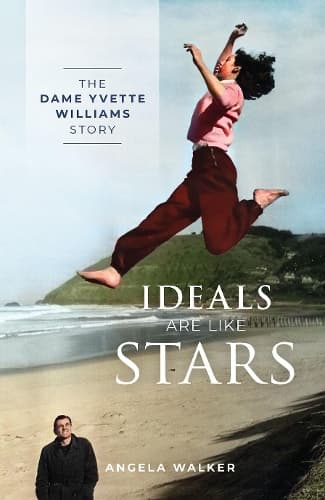Review: The Dame Yvette Williams Story: Ideals Are Like Stars
Reviewed by Sarah Ell
Women’s sport is increasingly in the spotlight these days, for both positive and negative reasons. Angela Walker’s biography of one of New Zealand’s greatest athletes — regardless of gender — is both timely and inspirational for a new generation of Kiwi sportswomen.
Yvette Williams, whose elevation to the status of Dame was revealed only shortly after her death in 2019, was the first New Zealand woman to win an Olympic gold medal, a feat which was not repeated for another 40 years. But winning gold in the long jump at the 1952 Helsinki Olympics was just one aspect of an athletics career which Walker has documented in lively and fascinating detail.
Given access to Williams’s diaries and other records by her family, Walker has painted a picture of a warm, positive, humble yet highly committed young woman who had to swim against the current of social pressure to achieve goals outside the usual ambit of the 1950s female. One of the ongoing tensions within the story is the pressure on Williams to marry and make a home, rather than travel and compete internationally.
The Dame Yvette Williams Story: Ideals Are Like Stars covers Williams’ early life and athletic career up until the 1954 Empire Games in Vancouver. It mostly concentrates on the years 1950–54, from the first time Williams competed (and medalled) at the 1950 Empire Games. Among the interesting parallels between Williams’ life and that of author Angela Walker, herself an Olympic and Commonwealth Games representative in gymnastics, is that they were both coached by Estonian refugee Emmy Bellwood.
Williams’ supportive coaching relationship with Emmy and her husband Jim forms a key theme of the book. In contrast to the highly monetised, win-at-all-costs attitude common in elite sport today, one of the keys to Williams’ success seems to have been her attitude towards her sport, fostered by the Bellwoods. Asked why she was able to shatter so many athletics records and achieve so highly, Jim is quoted as saying, ‘I can’t emphasise too strongly that the primary aim of all sport is enjoyment, recreative relaxation and the moulding of a healthy character.’
Williams’ letters and diaries recorded a wealth of detail about her experiences and thoughts; Walker has used them through creative non-fiction techniques to imagine scenes and dialogue. This has the effect of bringing the reader close to the action, both in social situations and at the various events Williams competed in, no doubt aided by Walker’s own experience of top-level competing.
While the book is largely chronological, it has a novelistic feel with one of the ongoing threads of tension running through it being Williams’ relationship with her boyfriend Charlie, the uncertainty she felt about their engagement and sustaining a relationship alongside her Olympic ambitions. After Vancouver, she retired from the sport, finally finding a true soulmate in Charles ‘Buddy’ Corlett and going on to be married for 60 years. At the time she was quoted as saying, ‘I am looking forward to a home of my own, and to children and to the things to which all women are entitled and which most women want. You can’t have a career in sport and look after a husband as he deserves.’
While Williams’ sporting prowess is impressive, what shines through most clearly in Walker’s book is the athlete’s determination to persist with pursuing her goals despite the pressures of friends, family and wider society to take the expected path.
The book’s title comes from a quote by American politician Carl Schurz which Williams pasted in the front of one of her scrapbooks, above a picture of one of her heroes, Jesse Owens: “Ideals are like stars. You will never succeed in touching them with your hands, but like the seafaring man on the valley of waters, you choose them as your guides, and following them, reach your destination.” Yvette Williams certainly did that and Walker has done her legacy a great service by bringing this inspirational story to life for a new generation.
Reviewed by Sarah Ell
